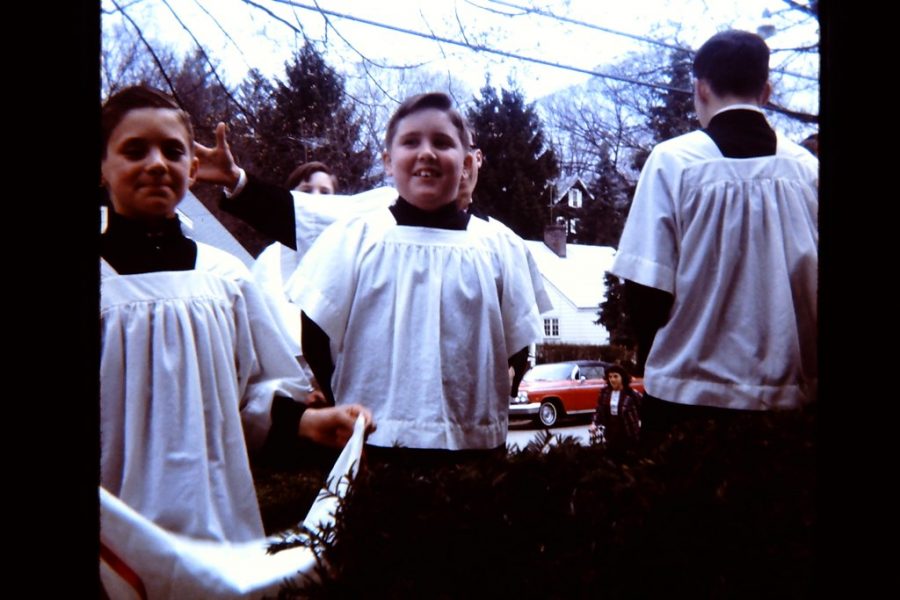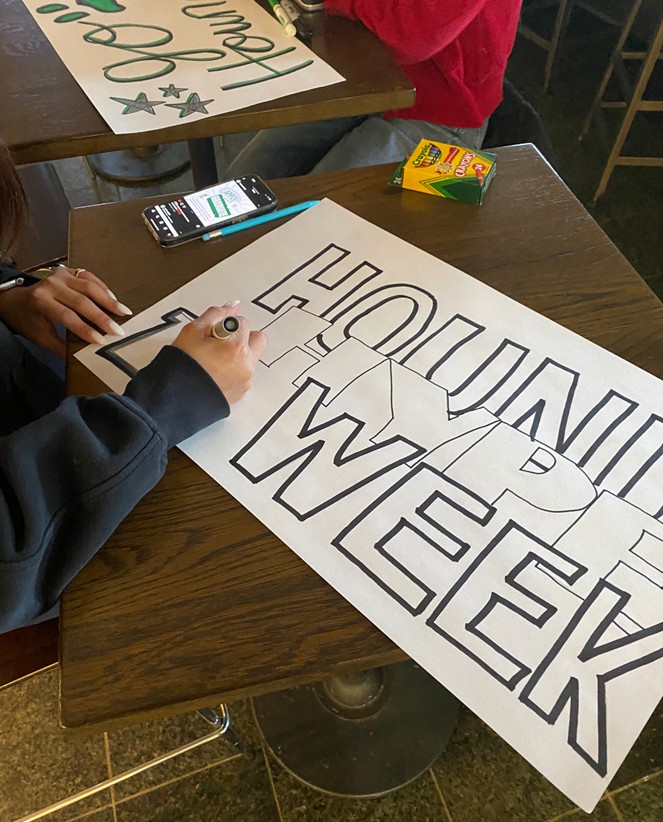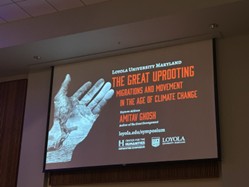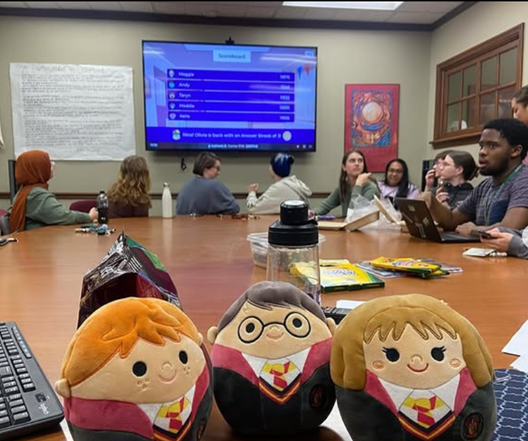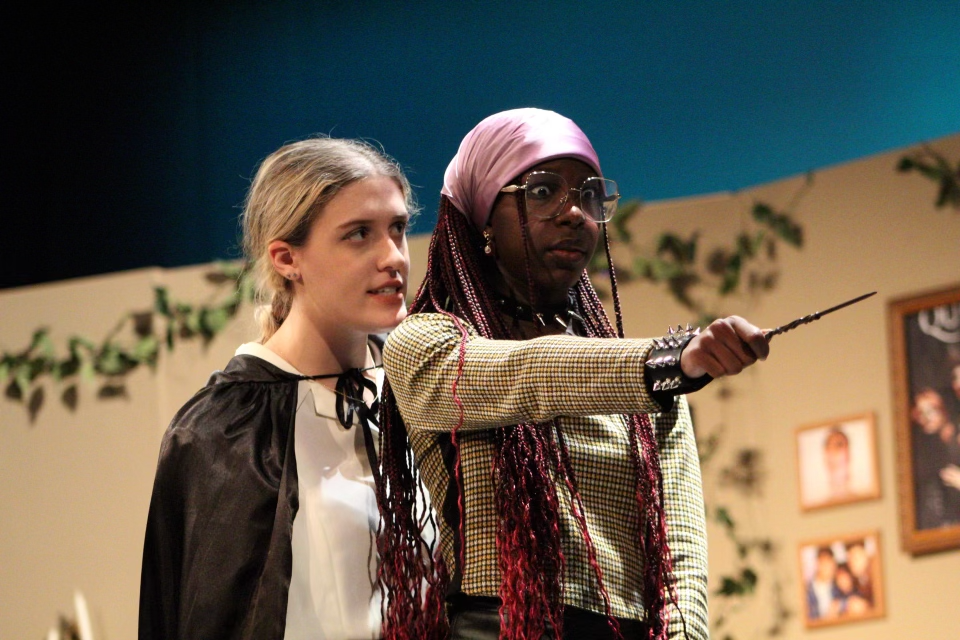From Oct. 27-30, The Poison Cup Players Loyola’s student-run theater group performed “Sin: A Cardinal Deposed.” Directed by senior Nick Palm, the play is the group’s first production of the year and was performed in the Black Box Theater.
The cast and crew worked for six weeks to put together staging, lights, set, and of course, perfect line delivery. Their hard work definitely paid off, as this was an extremely successful start to the theater season.
Despite the overall positive reaction to the production, the play itself did not focus on a positive subject matter. In fact, it discussed the topic of sexual abuse of minors by clergymen in the early 2000s. The show is set in Suffolk, Massachusetts in 2002, and it looks at the presence of sexual abuse in the Catholic Church.
The primary focus of the show is the trial of Boston’s archbishop Cardinal, Bernard Law, (senior Joe Mucciolo), who is being questioned by attorney Patricia Kreiger (senior Olivia Calamia). In this court order, which is based completely on true events, Kreiger questions Law about his supervision of priests used of child molestation, specifically Father John Geoghan and Father Paul Shanley. The story goes back and forth between Law, Kreiger, and Law’s attorney Debra Varley (junior Emma Ditzel), as they proceed through Law’s deposition.
While most of the show consists of the heated debates in the courtroom, it is contrasted with deeply emotional monologues of people involved with the child sex scandals. These monologues were given by freshmen Serina Addona, Jonas Micolucci, and senior Annie Malady. They included monologues of former victims, family members of victims, and fellow priests of the accused. The characters had no formal names in the playbill, so roles of the victims were swapped among Addona, Micolucci, and Malady
The show concluded with a heart-wrenching monologue by freshman Liam Doerr. He plays a victim of sexual assault, and it is his case that led to the deposition being played onstage. The show’s final words recount the memory of his abuse by Father John Geoghan. The most sickening part was that the priest stayed in the Catholic Church for at least 40 years after the incident. Father Geoghan, like the other priests who committed this act, were simply moved to unsuspecting parishes until they resigned.
This play tackled a hard-hitting subject, and was not easy to watch. “I thought it was great. It gave me the chills,” first year Maddy Fischer said. “It offered a whole new perspective to the Catholic Church that we usually don’t see.”
Another first year, Nikki D’Ambrosia, agreed. “It was so amazing,” she said.
This production was Calamia’s fourth and final Poison Cup Players show. “This has been a really awesome experience and I’ve met a lot of great people. It’s sad to leave because it’s a club that’s very close to my heart, but I know that all of the first years, sophomores, and juniors will leave a great legacy,” she said.
This show had an amazing cast dynamic, and it was evident that they all loved working together on this production. At the end of each performance, they celebrated their good work, and praised each other on their performances. Praising each other was really important to the cast, and it was something they did at the end of each rehearsal leading up to the show.
Director Nick Palm layed a huge role in putting the show together, even if he won’t admit it himself. “I keep going back and thinking I didn’t really do much. I basically said ‘This is what I want’ to actors, crew, and designers. I’m less of a director and more of a facilitator,” he said.
Of course, Palm did not accomplish all of this success alone. Stage manager Cassie Weaver, a junior, and the crew who worked on set, lighting, costumes, sound, props, and everything in between contributed greatly to the success of the show.
The most intriguing aspect of this show was that it showed a negative side to the inner workings of the Catholic Church. It portrayed the wrongdoings of priests who committed unforgiving crimes and others who tried to cover them up. Criticism of the Church is very controversial, especially given that it was performed at a Jesuit university. However, the play was extremely welcomed and supported at Loyola, and there were no problems with its provocative subject.
Palm described the whole experience as very daunting. “It’s scary because you’re worried about the backlash you’re going to get,” he said. “But what I think makes Loyola such a phenomenal place is that in areas where I thought I was going to receive pushback, it’s been nothing but support and love and encouragement.”
Even university president Father Brian Linnane came to see the show and actively participated in a talk-back after the opening night performance. He may not have agreed with everything the show offered, but he was fully involved in the subject and completely supportive of the production.
“This show was a gift that we all worked really hard on and put a lot into only to give it away at the end. What makes it so special is that it’s not something we hold onto. That’s what makes it so important,” Palm said.
Overall, it was an amazing show that the cast and crew put on. If you loved “Sin,” or didn’t have a chance to see it, watch out for Poison Cup Players’ next production, “Macbeth,” which will be showing in McManus Theater Nov. 17-20.
Feature Image: Susan Quinn Photo, Courtesy of Flickr







































































































